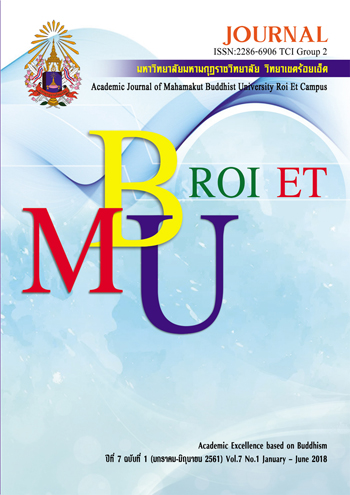The Development of Learning Management Model with Multiple Intelligence-Based Theory to Mathayomsuksa 4 Students’ Skill of Reasoning under a Core Subject Group of Mathematics
Main Article Content
Abstract
The Objectives of the research article were to 1) to study fundamental data to develop a learning management model with the multiple intelligence-based theory to Mathayomsuksa 4 students’ skill of Reasoning under the core subject group of mathematics, 2) to develop the learning management model with the multiple intelligence-based theory to reinforce their skill as set by the effective criterion at 80/80, 3) to try out it, 4) to evaluate and adjust it. The samples for conducting the research gained by the Purposive Selective were 42 Mathayomsuksa 4 students of 2nd classroom in academic year B.E. 2560’s 1st semester at 1st Municipal School in Suea kok Witthayasan School T.Suea kok A.Wapipathum Mahasarakham Province. The research tools were handouts of: questionnaires, the interview, the document analysis, the learning management, the learning achievement, the teaching model evaluation, and the questionnaires for eliciting students’ satisfaction with the learning management model. Data analyses were processed with percentage, arithmetic mean, standard deviation, t-test (Dependent Samples) and content analyses.
Outcomes of the research unveil the following findings:
1. The result of studying the fundamental data to develop a learning management model with the multiple intelligence-based theory to reinforce Grade IV students’ skill of calculation under the core subject group of mathematics, of which it is greatly required by students, has been found that the majority of students need using it as it enables them to gain knowledge, have the increasing skill of calculation, make the atmosphere in the classroom joyous, let them join the group in the class with peers, generate various instructional activities, let everyone participate in activities, and apply knowledge to solving problems in everyday life.
2. The result of developing the learning management model with the multiple intelligence-based theory to reinforce their skill of calculation under the core subject group of mathematics has earned the effective value of E1/E2 at 77.78/76.67 in the form of individual tryout, and the effective value of E1/E2 at 78.89/77.78 in the form of a small group. In addition to the result from the field test, the effectiveness of the learning management model with the mentioned theory amounts to 81.39/80.00, thereby being conducive to the established criterion at 80/80.
3. The result of trying out the learning management model with the said theory to samples of 42 students has gained its effectiveness of E1/E2 at 83.53/82.06. As a result, students’ learning achievement at the posttest is higher than theirs at the pretest, with the level of statistical significance at .05.
4. The result of evaluating the learning management model with the same theory following experts’ opinions has found that it can be brought into practical use for the learning management, and their overall satisfaction with it is at the highest scale as the same.
Article Details
References
กระทรวงศึกษาธิการ. (2552). หลักสูตรการศึกษาขั้นพื้นฐานพุทธศักราช 2551. กรุงเทพฯ : โรงพิมพ์องค์การรับส่งสินค้าและพัสดุภัณฑ์.
จามรี สมานชาติ. (2554). การเปรียบเทียบผลสัมฤทธิ์ทางการเรียนและเจตคติต่อคณิตศาสตร์ของนักเรียน ระดับชั้นมัธยมศึกษาปีที่ 3 ที่เรียนด้วยการจัดการเรียนการสอน เรื่อง ความน่าจะเป็นตามแนวคิดทฤษฎีคอนสตรัคติวิสต์กับทฤษฎีพหุปัญญา. ปริญญาการศึกษมหาบัณฑิต หลักสูตรและการสอน. บัณฑิตวิทยาลัย : มหาวิทยาลัยมหาสารคาม.
โชคชัย บุญพา. (2548). การพัฒนาแผนการจัดการเรียนรู้สาระการเรียนรู้คณิตศาสตร์ชั้นประถมศึกษาปีที่ 6 เรื่อง เศษส่วนการบวก การลบ การคูณและการหารเศษส่วนโดยการประยุกต์ใช้ทฤษฏีพหุปัญญา.วิทยานิพนธ์ (หลักสูตรและการสอน). มหาสารคาม : บัณฑิตวิทยาลัยมหาวิทยาลัยมหาสารคาม.
ทองแปลน ชมพูทัศน์. (2549). การพัฒนาแผนการจัดการเรียนรู้เรื่อง เศษส่วน กลุ่มสาระการ เรียนรู้คณิตศาสตร์ชั้นประถมศึกษาปีที่ 5 โดยการประยุกต์ใช้ทฤษฏีพหุปัญญา. การศึกษาค้นคว้าอิสระ กศ.ม.. มหาวิทยาลัยมหาสารคาม. มหาสารคาม.
นภเนตร ธรรมบวร. (2545). การพัฒนากระบวนการคิดในเด็กปฐมวัย. กรุงเทพฯ : สำนักพิมพ์ จุฬาลงกรณมหาวิทยาลัย.
บุญชม ศรีสะอาด. (2547). วิธีการทางสถิติสำหรับการวิจัย. กาฬสินธุ์ : ประสานการพิมพ์.
รัชตา เกาะเสม็ด. (2559). การสร้างกิจกรรมการเรียนรู้คณิตศาสตร์ตามทฤษฎีพหุปัญญา เรื่องพื้นที่ผิวและปริมาตร สำหรับนักเรียนชั้นมัธยมศึกษาปีที่ 3. คณะวิทยาศาสตร์.มหาวิทยาลัยบูรพา.
โรงเรียนในสังกัดองค์การบริหารส่วนจังหวัดมหาสารคาม. (2560). รายงานประจำปี 2560. องค์การบริหารส่วนจังหวัดมหาสารคาม : จังหวัดมหาสารคาม.
สุวิทย์ มูลคำ และอรทัย มูลคำ. (2544). 19 วิธีการจัดการเรียนรู้เพื่อพัฒนาความรู้และทักษะ. กรุงเทพฯ : โรงพิมพ์ภาพพิมพ์.
หทัยรัตน์ ภูงามจิตร. (2558). การเปรียบเทียบผลสัมฤทธิ์ทางการเรียน ความสามารถในการคิดวิเคราะห์และความพึงพอใจต่อการเรียนรู้ กลุ่มสาระการเรียนรู้คณิตศาสตร์ เรื่องความรู้เบื้องต้นเกี่ยวกับ จำนวนจริง ของนักเรียนชั้นมัธยมศึกษาปีที่ 2 ที่เรียนด้วยการจัดกิจกรรมการเรียนรู้ตาม แนวคิดทฤษฎีพหุปัญญา และการจัดกิจกรรมการเรียนรู้ตามแนวคิดทฤษฎีคอนสตรัคติวิซึม. บัณฑิตวิทยาลัย : มหาวิทยาลัยมหาสารคาม.


